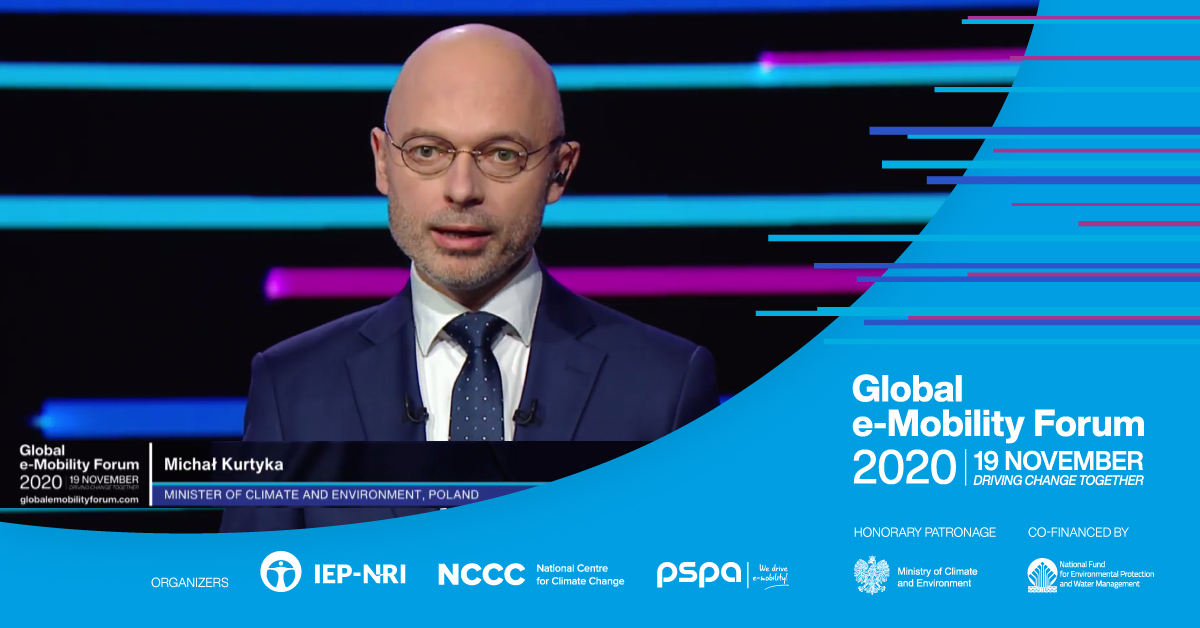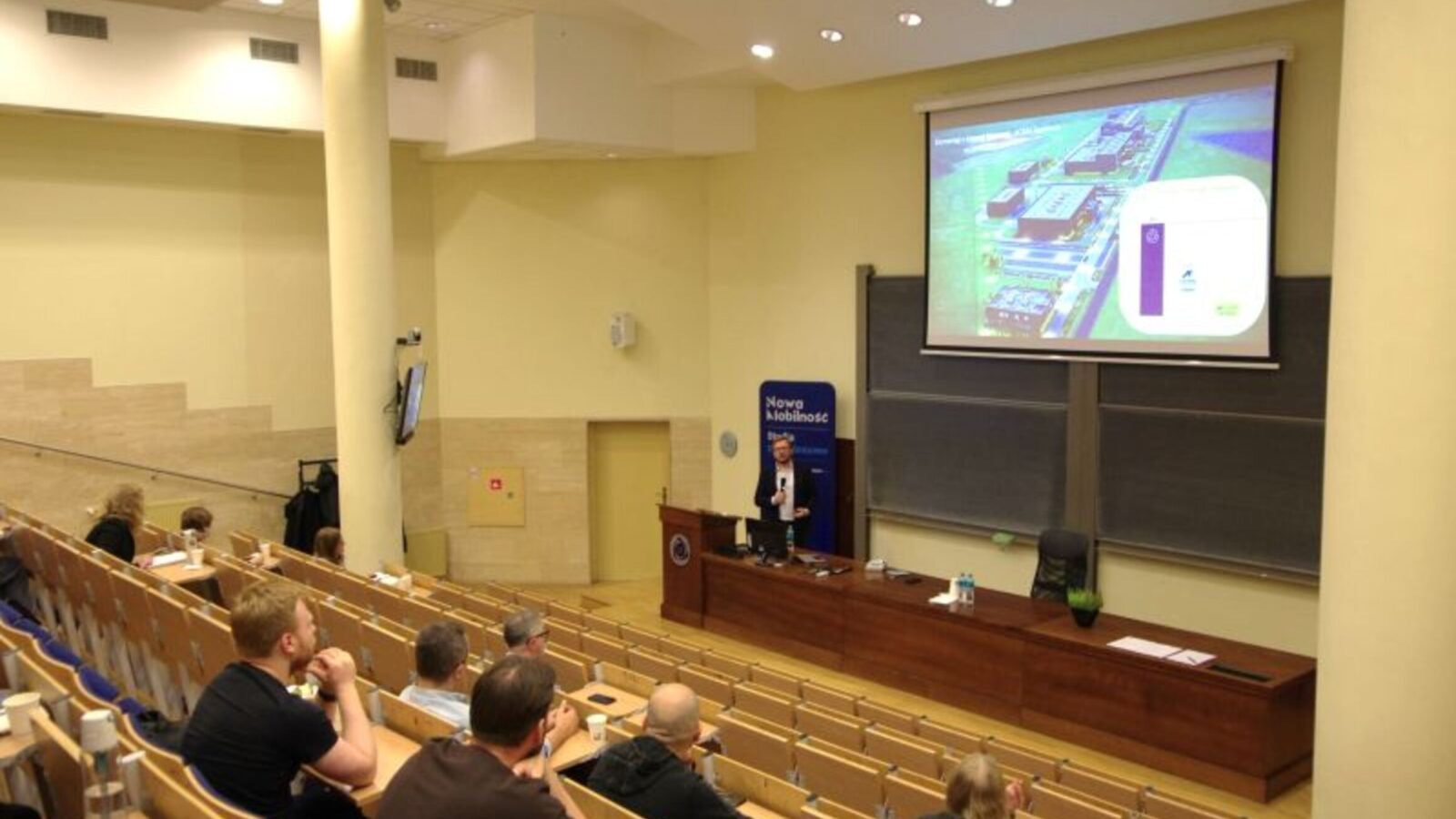Global e-Mobility Forum is one of the largest conferences on e-mobility in the world. It was attended by 52 speakers from 22 countries, high level representatives of the EU, UN, UNFCCC, ministers, representatives of science and business from all over the world. How do representatives of such countries as Great Britain, Sweden, Switzerland, Greece, Portugal, the Czech Republic, Egypt and many others perceive the development of e-mobility?
The beginnings of the Global e-Mobility Forum 2020 date back to 2018, when during the 24th Conference of the Parties to the United Nations Framework Convention on Climate Change in Katowice the “Driving Change Together — Katowice Partnership for Electromobility” declaration was signed. Since 2019 the event has been held as an annual forum. This year’s edition, organized by the National Centre for Climate Change (Institute of Environmental Protection – National Research Institute) and the Polish Alternative Fuels Association, just like a year ago, gathered several hundred Polish and foreign representatives of EU and state administration, local governments, NGOs, enterprises, experts and market practitioners from all over the world. This year, however, the participants met online. The conference was officially opened by Michał Kurtyka, Minister of Climate and Environment, who emphasized the key role of e-mobility in the context of sustainable development.
The EU on its way to zero emissions
– In September this year, the number of EV registrations in Europe was for the first time higher than the number of registrations of diesel vehicles. It is a very important moment in the history of the automotive industry, which clearly shows that e-mobility is not a temporary trend. Research shows that in 2023 there will be about 54 million electric vehicles on roads all over the world, said Michał Kurtyka. As the minister stressed, the transformation of the automotive sector is taking place here and now. More and more people are realizing that the world is really changing, and that the next bastions of conventional automotive industry are switching to e-mobility. Zero-emission technology is the way to climate neutrality in the transport sector.
During the opening of the Global e-Mobility Forum, Adina Vălean, the European Commissioner for Transport, also made an appearance, confirming that e-mobility provides the basis for the implementation of the European Green Deal. At the same time, the European Union intends to introduce legal regulations accelerating the pace of the development of zero-emission transport.
– The EU’s goal is to reduce greenhouse gas emissions by at least 55% by 2030. To achieve this goal, 20% of the passenger car fleet and 1% of trucks must be zero-emission vehicles, said Adina Vălean.
The European Green Deal also sets ambitious goals for the charging infrastructure. By 2025, the network of chargers in the European Union will include one million publicly available charging points. The simulation shows that this number will increase to at least 3 million by 2030. In view of these ambitious goals, we will propose to review the Alternative Fuels Infrastructure Directive. We must accelerate the EU-wide deployment of a fully interoperable charging infrastructure, not only for passenger cars, but also for heavy goods vehicles.
Ovais Sarmad, Deputy Executive Secretary of the United Nations Framework Convention on Climate Change (UNFCCC), pointed out that the development of e-mobility entailed not only positive ecological consequences but also economic ones.
– Due to the fact that over 90% of energy still comes from fossil fuels, we are well aware of the fact that the transport sector needs to be decarbonised. Fortunately, one of the key solutions to achieve zero emissions in transport, both in the European Union and globally, is now ready thanks to electric vehicles. Another piece of good news is that every job that currently exists with traditional car manufacturers will be replaced with new jobs in the e-mobility industry, said Ovais Sarmad.
The decade of e-mobility and 2020 as a catalyst for positive changes in the use of clean transport, as well as the Green Deal and the planned economic recovery after the COVID-19 pandemic were the main topics of the Ministerial Round Table, which took place immediately after the official opening of the event. The debate was moderated by the Minister of Climate and Environment, Michał Kurtyka.
Government representatives on e-mobility
On one hand, there is a growing social awareness that favours the transition to clean transport. On the other hand, the COVID-19 pandemic, which has brought losses to the automotive sector. The question regarding plans and prospects for the next decade opened the first part of the debate.
– Two years ago, during the COP24, Poland and Great Britain launched the Driving Change Together – Katowice Partnership for Electromobility initiative. I am glad that Poland continues its efforts in this area and connects countries in their activities for e-mobility. We need to increase our efforts in respect of transition towards zero-emission transport. Great Britain is ready. Yesterday, Boris Johnson announced that the date of moving away from combustion cars would be accelerated from 2040 to 2030 – said Nadim Zahawi, British Minister for Business and Industry.
In Sweden, decisions about the automotive industry will be equally important for the environment.
– Over the next 25 years, emissions from the transport sector in our country are to be reduced to zero. In our opinion, it is important to create a sustainable battery industry at the EU level, said Emil Högberg, Secretary of State at the Ministry of Enterprise and Innovation of Sweden.
– Ukrainian e-mobility is developing very well. We expect that in the coming years, there will be 50,000-60,000 new electric vehicles on roads. We pay special attention to the development of zero-emission public transport; we have implemented, among others, a dedicated program in this respect for 20 cities – added Vladyslav Kryklii, Minister of Infrastructure of Ukraine.
Electric Mobility Roadmap 2022 is a plan that aims to achieve 50% of the electric fleet in 2022 in Switzerland. – We are developing a fast charging infrastructure. We invest in hydrogen mobility in the area of heavy transport. Today Switzerland joins the Driving Change Together – Katowice Partnership for Electromobility initiative – said Benoît Revaz, Secretary of State at the Swiss Federal Energy Office. During the Global e-Mobility Forum 2020, in addition to Switzerland, Romania and the Netherlands also joined the Driving Change Together initiative, launched during the COP 24 in Katowice.
What after Covid-19?
The Green Deal and the planned support for post-pandemic recovery put emphasis on e-mobility in terms of achieving EU objectives related to the transport sector. Minister Michał Kurtyka asked representatives of the Greek, Portuguese and Czech governments how they plan to support the zero-emission transformation of transport in the coming years.
– Greece has set very ambitious energy and climate targets for the coming years and specific objectives for the next 10 years with regard to clean transport. In 2030, 30% of newly registered cars will have to be equipped with an electric drive. A few months ago, the regulatory framework for e-mobility was adopted in Greece for the first time, revealed Alexandra Sdoukou, Secretary General at the Ministry of Environment and Energy of Greece.
– Portugal has recently adopted a national hydrogen strategy, and decarbonising transport is the goal that will largely contribute to the use of this fuel. Transport based on biofuels will play a complementary role, added João Pedro Matos Fernandes, Portuguese Minister of Environment and Climate Action.
– The Czech Republic is striving to reduce emissions in road transport and to increase the number of electric vehicles. We use state funds to support the implementation of this plan. The key areas of co-financing are public transport and charging infrastructure – emphasized Edurad Muricky, Deputy Minister of Industry and Trade of the Czech Republic.
In the last part of the debate, Minister Michał Kurtyka stressed that the e-mobility ecosystem was open to new business models and the involvement of companies from countries that had so far not treated the automotive market as the centre of their economic policy. The minister asked representatives of Egypt, Andorra and Palestine what they had to offer to the zero-emission transport ecosystem.
– Egypt is strongly committed to implementing zero-emission technologies in transport. Therefore, we engage in various partnerships. We see sense in a gradual transformation with institutional support, financial mechanisms and strong political orientation, said Yasmin Fouad, Egyptian Minister of the Environment.
– Andorra is a small country. Our fleet consists of 90,000 cars – that’s more than all the inhabitants of the country, and due to the fact that there is no airport, tourists also come only by car. Andorra intends to develop e-mobility powered by clean energy – added Jordi Gallardo Fernàndez, Minister of Presidency, Economy and Business of Andorra.
– Palestine has recently strengthened efforts to create a policy supporting the development of e-mobility. More and more charging stations are being built across the country, said Jameel Mtour, president of the Palestinian Environmental Quality Authority.
– Today, the capital of e-mobility is in Warsaw, from where we are remotely connecting with Forum participants from all over the world, said Agnieszka Ragin – Head of the National Centre for Climate Change, Deputy Director of the Institute of Environmental Protection – National Research Institute for Climate Change and International Cooperation. – Everyone should remember that every journey matters to the environment and climate. Events such as the Global e-Mobility Forum are very important for the intensification of international cooperation and the exchange of good practices in the field of transport – said Agnieszka Ragin.
Maciej Mazur, Managing Director of the Polish Alternative Fuels Association, Vice-President of The European Association for Electromobility (AVERE), addressed the participants of the Forum, referring to the current pandemic situation.
– COVID-19 has changed the world a lot in the last few months. – But the good news is that, against all odds, we can meet online – said Maciej Mazur. – The development of zero-emission technologies in transport is key to achieving the goal of climate neutrality. We must set new trends for public administration and the entire industry, but also develop an international e-mobility community. That is why we have created the Global E-mobility Forum – emphasized the Managing Director of PSPA.



